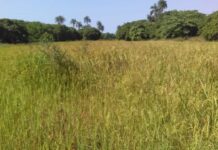Abdoulai G. Dibba
The United Nations Food and Agriculture Organisation in partnership with the Ministry of Agriculture, on Wednesday 15th November 2017, validated the Livestock Census Results at a local Hotel in Kololi.
In his welcome remarks, the Director General of the Department of Livestock Lamin Saine, said the timely collection and analysis of accurate and reliable livestock data, is required to enable policy makers and institutions engaged in livestock and livestock related activities to plan, follow-up and prepare appropriate and timely responses to issues affecting the development of the livestock sub-sector.
He said accurate and timely data have the potential to reduce disease incidence and increase production and access to markets; that correct information has the potential, if availed and used properly, to reduce impediments to trade and increase access to markets.
DG Saine concluded that the census has collected data on the 5 Core Livestock species : cattle, sheep, Goats, Pigs and Chicken, as recommended by the Global Strategy to Improve Agriculture and Rural Statistics and on 6 other items of national interest: Guinea Fowl, Ducks, Horses, Donkeys, Mules and Rabbits.
In her remarks, the FAO Country Representative to the Gambia Dr. Perpetua Katepa-Kalala asserted that the National Livestock Census is conducted under the FAO funded TCP project on ‘support to capacity development, in conducting livestock census in The Gambia’ and that the project is fully aligned to the Gambia’s development priorities, United Nations Development Assistance Framework (UNDAF), the National Development Plan (NDP) and the Agriculture and Natural Resources (ANR) Policy.
She pointed out that it is common knowledge that political will is the foundation for national food security as well as economic and social development.
Dr. Katepa Kalala noted that the absence of reliable and accurate data adversely affects the ability to formulate effective policies, regulations and decisions and key among these she said, are investment decisions in the sector by the private and public sector as well as other stakeholders such as farmer organisations.
Dr. Katepa-Kalala noted that data collected provides a snapshot of the state of a country’s agricultural sector from the size of holdings, land tenture, land use, area harvested, irrigation, livestock, labour and other agricultural inputs.
She added, “This information is vital in agricultural planning and policy-making, research and development and monitoring the impact of agriculture on the environment”.
In conclusion, she stated that the FAO Gambia country office was able to engage its pool of technical experts in both agricultural statistics and livestock production and health at all levels, (headquarters, regional offices, sub-regional as well as at country levels), for the successful implementation of the project.
On his part, the Minister of Agriculture Omar Amadou Jallow indicated that 60% of the rural population are involved in livestock rearing; that the sub-sector will mostly and certainly remain a major source of their livelihood.
Minister Jallow indicated that Livestock has been shown to provide a practical and effective first-step in alleviating rural poverty; that for centuries it has been an integral part of small rural households and will continue to be the same, for the foreseeable future.
‘‘In the world today, livestock contributes to the sustainable livelihoods and security of more than 800 million poor smallholders first as Natural Capital providing meat, milk, wool, hide, rangeland, and pasture; second as a Financial Capital providing cash, savings, credit, insurance and gifts and third as a Social Capital to satisfy traditional and festival needs, wealth, prestige, identity, respect, dowry, etc.
‘‘In the Gambia,’’ Minister Jallow went on, ‘‘the absence of appropriate livestock policies and regulations is as a result of the lack of accurate livestock data for decision making.’’
He said the data from the 1993 National Livestock Census is obsolete and is inappropriate for decision making and advocacy in this modern day; that an attempt to conduct a National Livestock Census in 2003 failed due to lack of resources and the non-commitment of the then Government to support the livestock sub-sector.
“Therefore, to address the paucity of livestock data, the ministry of Agriculture requested FAO for a technical and financial support and this census report being validated today, is one of the major outputs of TCP/GAM/3504 which was signed on 29th June 2016 with funding to the tune of D17, 252,000.00 Seventeen Million Dalasi), to provide the needed information to promote livestock production as a practical and viable option for poverty alleviation” he concluded.



















